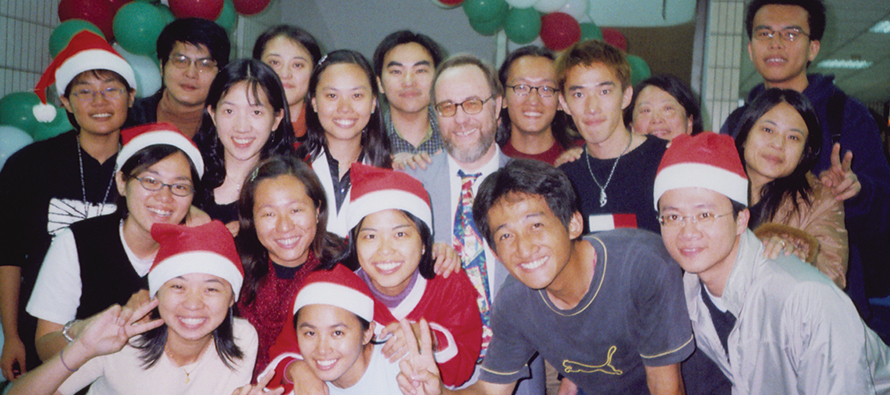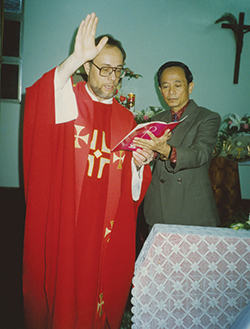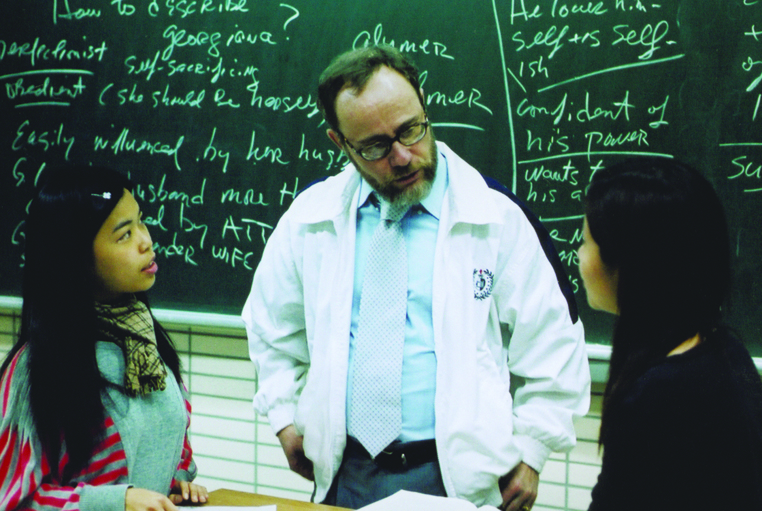Holy Toledo! How I wound up in Taiwan

Image: Christmas with my American Literature students.
One of the questions my students here in Taipei often ask is, “Why did you become a shen-fu?” Shen-fu is the Mandarin Chinese word for Catholic priest. Why did I become a shen-fu? That’s a pretty good question.
The second most-asked question is, “Why did you come all the way to Taiwan to be a shen-fu?” Chinese college students can ask good questions!
To tell people why I’m a shen-fu today, I always reach back in my memory and talk about a priest I knew as a boy. When I was growing up, we had three wonderful priests at my parish in Toledo, Ohio. The first, our pastor, was a scholarly Irish American monsignor. He did gobs of hospital visiting when people were sick, drove a fancy car, and wore old-fashioned wire-rimmed glasses.
We had two assistant pastors. The first was a tall, young guy who had been an Eagle Scout and who liked camping and hiking. This Boy Scout priest had energy to burn. He was always in a hurry and did everything fast. He walked fast, spoke fast, and said the fastest Masses in the city of Toledo.
Our third priest was a little older than the Boy Scout priest and was quiet, gentle, and very humorous. This priest liked books and had a warm way with people of all ages. He radiated a glow of happiness to those around him and seemed at peace with the whole world. He never seemed to be in a hurry. He had time to stop and listen to people’s troubles but time to enjoy life, too. I remember he drove an old clunker of a car and liked to make jokes about the car in his sermons. That quiet priest with a sense of humor really appealed to me. His name was Father Paul Mueller.
Why did I become a shen-fu? A big part of the reason was that I wanted to be like Father Mueller. He had the kind of personality that made people feel God’s love was near, almost standing right beside them. I served many Masses for him and sometimes talked with him about my future.
As a kid, I felt nervous easily, and for a while I stuttered. I had things to say, but they’d pile up like cars in a traffic jam and wouldn’t come out right. Father Mueller didn’t lose his cool when I stuttered. He just smiled and let me take my time. I always felt that he showed me what God is like. Father Mueller was a happy man, a man who loved people and his work, and I wanted to be like him when I grew up.
I always felt there was a lot in common between my dad and Father Mueller. Dad ran a hardware store and knew how to treat people with a relaxed and friendly spirit. My dad was not a learned man, but he taught me more about life than any book or school could ever teach. Dad had optimism, hope, and generosity of spirit, and when he made a promise, he kept it. Dad also knew how to have fun. He probably didn’t know it, but he taught me a lot about how to be a shen-fu.
Father Mueller showed me that a warm and gentle personality centered on God could be like a ray of sunshine in the lives of other people. From him I learned how to take a loving heart for God and combine it with Dad’s way of treating people.
Sharing the gospel
The life I saw Father Mueller lead back in Ohio was rooted in a parish church next to a busy Catholic grade school. In Taipei I don’t live at a church but at a big Chinese university with 20,000 students. Of course I have my own room and furniture, but I live in a large school building.
As a missionary, I spend as much of my time as I can with students who do not believe in Jesus Christ. I do all I can to put myself in positions so that students will meet and know me and share in my work and life.
I teach 16 hours a week, correct homework till my eyes turn red, offer counseling, attend student activities and meetings, and pray that with God’s grace, these fine young people may one day want to talk more with me about Christ. Actually, many students do talk about God or Jesus with me.
In teaching, I sometimes do that, too. Whether or not I use God’s name out loud is not so important. As a missionary, I feel that if in some way God can use me to show my students patience and care, then, along with many other missionaries, I am showing people the meaning of the gospel.
On Sunday mornings back in Toledo, Father Mueller would walk to church for Masses. His walk would take him about two minutes. When he said Mass, he spoke English and had hundreds of Catholics before his altar, almost all of them white people like himself.
On Sunday mornings I get up at 6 and take a couple buses for an hour to get to my mission station church in the little village of She-tze, near Taipei. About 50 people usually come to Mass at She-tze. We speak Chinese, not English, for everything at She-tze, including Mass and sermon and relaxing together afterwards. The people at Mass are all Chinese. They are friendly to me and kind to each other, and I love them very much.
A life of quiet adventure
Missionaries tend to make contact with a wide range of people, and I, too, have been able to immerse myself in Taipei society. I write a weekly column about life and society for an English newspaper in Taipei, and occasionally students or other groups interview me. Sometimes high schools ask me to help them hire new English teachers or to serve as a judge for speech or poetry-reading contests.
I have variety in my life in other ways, too. Some of my students come from different countries in Asia, for example. Some are from Hong Kong or other lands where Chinese people live, like Malaysia, Indonesia, Japan, and Korea.
Often I think about the kind of man I have become as a missionary here in Taiwan. Much of my way with students is the way I learned from the two people who have influenced me most in life: my dad and Father Mueller. Why did I become a shen-fu? Because I wanted to be like Father Mueller and my dad all rolled into one.
Why did I want to come to Taiwan to work as a priest? Actually the answer is very simple. The war in Vietnam was going on when I was in high school and college, and, like many Americans then, I developed a keen interest in Asian peoples. I had always felt especially drawn to the language and culture of Japan, China, and Taiwan.
Before being ordained, I volunteered to become a college teaching priest in either Japan or Taiwan, and the superiors of my religious community sent me to Fu Jen University in Taiwan. When I first arrived, I studied Mandarin Chinese for a year and a half. Then I began teaching literature and English language courses at Fu Jen.
Speaking and reading Chinese have enriched my life enormously and helped to pave the way for my ministry here. I love my many contacts with students and my ministry at the She-tze parish mission on Sundays. I’ve come a long way from my days of stuttering through a conversation with Father Mueller, but as I look at my life as a missionary priest, I feel very lucky to be living a life of quiet and colorful adventure here among my Chinese friends.
One of the questions my students here in Taipei often ask is, “Why did you become a shen-fu?” Shen-fu is the Mandarin Chinese word for Catholic priest. Why did I become a shen-fu? That’s a pretty good question.
The second most-asked question is, “Why did you come all the way to Taiwan to be a shen-fu?” Chinese college students can ask good questions!
To tell people why I’m a shen-fu today, I always reach back in my memory and talk about a priest I knew as a boy. When I was growing up, we had three wonderful priests at my parish in Toledo, Ohio. The first, our pastor, was a scholarly Irish American monsignor. He did gobs of hospital visiting when people were sick, drove a fancy car, and wore old-fashioned wire-rimmed glasses.
| John Chang, the catechist at She-tze, helps the author at a wedding. |
Our third priest was a little older than the Boy Scout priest and was quiet, gentle, and very humorous. This priest liked books and had a warm way with people of all ages. He radiated a glow of happiness to those around him and seemed at peace with the whole world. He never seemed to be in a hurry. He had time to stop and listen to people’s troubles but time to enjoy life, too. I remember he drove an old clunker of a car and liked to make jokes about the car in his sermons. That quiet priest with a sense of humor really appealed to me. His name was Father Paul Mueller.
Why did I become a shen-fu? A big part of the reason was that I wanted to be like Father Mueller. He had the kind of personality that made people feel God’s love was near, almost standing right beside them. I served many Masses for him and sometimes talked with him about my future.
As a kid, I felt nervous easily, and for a while I stuttered. I had things to say, but they’d pile up like cars in a traffic jam and wouldn’t come out right. Father Mueller didn’t lose his cool when I stuttered. He just smiled and let me take my time. I always felt that he showed me what God is like. Father Mueller was a happy man, a man who loved people and his work, and I wanted to be like him when I grew up.
I always felt there was a lot in common between my dad and Father Mueller. Dad ran a hardware store and knew how to treat people with a relaxed and friendly spirit. My dad was not a learned man, but he taught me more about life than any book or school could ever teach. Dad had optimism, hope, and generosity of spirit, and when he made a promise, he kept it. Dad also knew how to have fun. He probably didn’t know it, but he taught me a lot about how to be a shen-fu.
Father Mueller showed me that a warm and gentle personality centered on God could be like a ray of sunshine in the lives of other people. From him I learned how to take a loving heart for God and combine it with Dad’s way of treating people.
| I’m always happy when students stay after class to ask questions. Pictured with me are Janet (left) and Coco. |
The life I saw Father Mueller lead back in Ohio was rooted in a parish church next to a busy Catholic grade school. In Taipei I don’t live at a church but at a big Chinese university with 20,000 students. Of course I have my own room and furniture, but I live in a large school building.
As a missionary, I spend as much of my time as I can with students who do not believe in Jesus Christ. I do all I can to put myself in positions so that students will meet and know me and share in my work and life.
I teach 16 hours a week, correct homework till my eyes turn red, offer counseling, attend student activities and meetings, and pray that with God’s grace, these fine young people may one day want to talk more with me about Christ. Actually, many students do talk about God or Jesus with me.
In teaching, I sometimes do that, too. Whether or not I use God’s name out loud is not so important. As a missionary, I feel that if in some way God can use me to show my students patience and care, then, along with many other missionaries, I am showing people the meaning of the gospel.
On Sunday mornings back in Toledo, Father Mueller would walk to church for Masses. His walk would take him about two minutes. When he said Mass, he spoke English and had hundreds of Catholics before his altar, almost all of them white people like himself.
On Sunday mornings I get up at 6 and take a couple buses for an hour to get to my mission station church in the little village of She-tze, near Taipei. About 50 people usually come to Mass at She-tze. We speak Chinese, not English, for everything at She-tze, including Mass and sermon and relaxing together afterwards. The people at Mass are all Chinese. They are friendly to me and kind to each other, and I love them very much.
A life of quiet adventure
Missionaries tend to make contact with a wide range of people, and I, too, have been able to immerse myself in Taipei society. I write a weekly column about life and society for an English newspaper in Taipei, and occasionally students or other groups interview me. Sometimes high schools ask me to help them hire new English teachers or to serve as a judge for speech or poetry-reading contests.
I have variety in my life in other ways, too. Some of my students come from different countries in Asia, for example. Some are from Hong Kong or other lands where Chinese people live, like Malaysia, Indonesia, Japan, and Korea.
Often I think about the kind of man I have become as a missionary here in Taiwan. Much of my way with students is the way I learned from the two people who have influenced me most in life: my dad and Father Mueller. Why did I become a shen-fu? Because I wanted to be like Father Mueller and my dad all rolled into one.
Why did I want to come to Taiwan to work as a priest? Actually the answer is very simple. The war in Vietnam was going on when I was in high school and college, and, like many Americans then, I developed a keen interest in Asian peoples. I had always felt especially drawn to the language and culture of Japan, China, and Taiwan.
Before being ordained, I volunteered to become a college teaching priest in either Japan or Taiwan, and the superiors of my religious community sent me to Fu Jen University in Taiwan. When I first arrived, I studied Mandarin Chinese for a year and a half. Then I began teaching literature and English language courses at Fu Jen.
Speaking and reading Chinese have enriched my life enormously and helped to pave the way for my ministry here. I love my many contacts with students and my ministry at the She-tze parish mission on Sundays. I’ve come a long way from my days of stuttering through a conversation with Father Mueller, but as I look at my life as a missionary priest, I feel very lucky to be living a life of quiet and colorful adventure here among my Chinese friends.
Tags
Related
- African dream: my 17 years in Kenya
- Lessons in love from central Brazil
- Missionary sister falls in love
- Sister Dorothy Stang: Her dying shows us how to live
- Refugee crisis 'a battle for our humanity' in Jordan
- Fighting gangs one youth at a time
- Starting over from scratch
- My mission: To be an instrument in God’s hands
- Beginning again in Ireland
- And Jesus said, “Feed my lambs.” Read More
Most Viewed
- Find your spirituality type quiz
- Questions and answers about religious vocations
- Celibacy quiz: Could I be a nun? Could I be a brother? Could I be a priest?
- Resources for older discerners or those with physical and developmental differences
- About Vocation Network and VISION Guide



